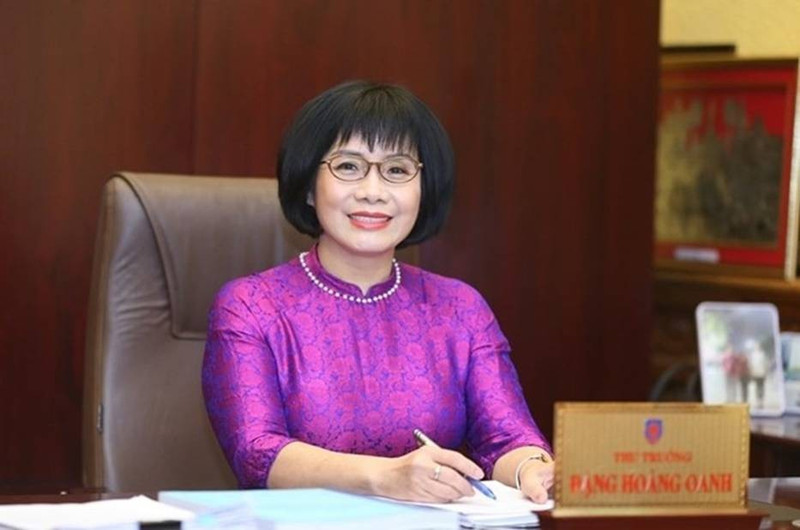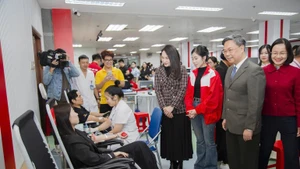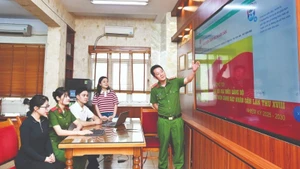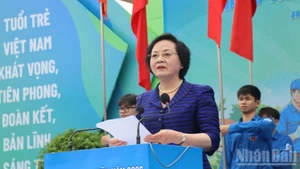Q: What role has the Beijing Declaration and Platform for Action played in ensuring women's rights?
A: The Beijing Declaration and Platform for Action is one of the most important documents in promoting women’s rights around the world, including Viet Nam. Over the past 30 years, it has played a vital role in developing national and international policies to protect and promote women’s rights, especially in areas such as education, health, the economy and political participation. … It has made an important contribution to promoting the feminist movement and changing cultural stereotypes about women’s role, and laid the foundation for important legal documents on gender equality and the protection of women’s rights in Viet Nam.
Despite the progress made, the implementation of the Beijing Platform still faces many challenges. Gender inequality remains evident in various areas of social life. Numerous cases of violence and sexual abuse against women and girls continue to occur. Addressing and intervening in these cases remains difficult and sometimes lacks prompt and satisfactory resolutions. Therefore, it is essential to remain committed and promote policies related to women’s rights based on the Beijing Platform.
Q: What progress has Viet Nam made in enhancing the role of women in decision-making?
A: Viet Nam has made significant progress in enhancing the role of women in politics and decision-making positions. Viet Nam has issued and implemented many programmes to enhance women’s leadership capacity, especially in State agencies and political organizations. These have provided many women with opportunities to study and improve their knowledge and skills in leadership and management, while breaking down cultural and social barriers regarding women’s roles in politics. The Government has implemented many national plans and strategies, especially the National Strategy on Gender Equality for the 2021–2030 period, which seeks to enhance women’s equal participation in leadership and management at all levels of policymaking.
The rate of women elected to the 15th National Assembly and People’s Councils at all levels for the 2021–2026 term is the highest ever. Specifically, the percentage of female National Assembly deputies reached 30.26 per cent; female provincial People’s Council deputies reached 29 per cent, female district People’s Council deputies reached 29.08 per cent; and female commune People’s Council deputies reached 28.48 per cent.
Q: What are some of the major obstacles to increasing women's representation?
A: Although Viet Nam has many policies and regulations aimed at strengthening women’s participation in leadership and decision-making, stereotypical views on the roles of women and men are still prevalent. Many still believe that men are better suited for leadership roles, while women should prioritize family care. As a result, women often lack the support and opportunities needed to advance in their careers.
In addition, women often face difficulties with work-life balance. For young women, the difficulties are even greater when they have small children and heavier housework responsibilities. Therefore, many women are overworked, and lack time to rest or cultivate their knowledge. Family responsibilities hinder their professional growth and advancement, leading to complacency and restricted ambitions. Balancing career and family has always been a challenge for women.
Q: What role does the Ministry of Justice play in ensuring gender-sensitive policymaking?
A: Legal documents drafted by the Ministry of Justice consistently integrate gender equality from the very beginning, from reviewing implementation, to examining legislation, to assessing policy impact. This process helps identify limitations in legal provisions on gender equality, enabling the Ministry to propose revisions to each specific draft law.
The appraisal of proposals and draft laws has gender mainstreaming as a key component. Throughout the process, the Appraisal Advisory Council ensures gender balance, including representatives from State management agencies on gender equality, such as the Central Committee of the Viet Nam Women’s Union, the Ministry of Labour and Social Affairs, and the Ministry of Culture, Sports and Tourism, as well as [women’s rights organizations and] gender experts, particularly from the Gender Expert Group of the Ministry of Justice. Since 2021, the Ministry of Justice has appraised 119 proposals for drafting legal documents, 677 projects and draft laws, and provided feedback on nearly 1,800 additional projects and drafts.
Q: What advice do you have for today’s aspiring young women leaders?
A: In a rapidly changing world, women must seize opportunities to learn, enhance their knowledge and adapt to new developments. Confidence is crucial to overcome gender stereotypes. Women must advocate for their perspectives and showcase their capabilities. Additionally, young women should develop soft skills such as time management, effective communication and teamwork, which are essential for managing tasks and building relationships in the workplace. A good leader possesses the ability to listen to and understand their team, fostering trust and motivation. Furthermore, young women should proactively connect with experienced individuals, colleagues and successful leaders to learn from their experiences, gain a more comprehensive understanding of their work and better orient their career paths.
Finally, do not be afraid of failure. Every failure is just a steppingstone, and from difficulties, women will hone their courage and ability to overcome barriers. By daring to take risks, stepping out of their comfort zones, and continuously learning, young women will not only achieve leadership positions but make greater contributions to society.
















